Here We Go Again With the Slavery Meme
Such is the example with the myth of "Irish slaves," an ahistorical reimagining of real events weaponized by racists and conspiracy theorists before the Web and now reaching vast new audiences online.
In brusk, the "Irish slaves" myth argues that the first slaves brought to the Americas were Irish gaelic, that they were white, and that this fact, covered up by liberal historians, undermines the legacy of the African slave trade and proves that modern theories of racial inferiority are truthful.
Predictably, this revisionism has attracted Neo-Nazis, White Nationalists, Neo-Confederates, and even Holocaust deniers, while racist trolls have deployed the myth to attack the Black Lives Matter motion. More than worrisome, though, is its widespread adoption by principally American Internet users as if it were a point of "Irish pride."
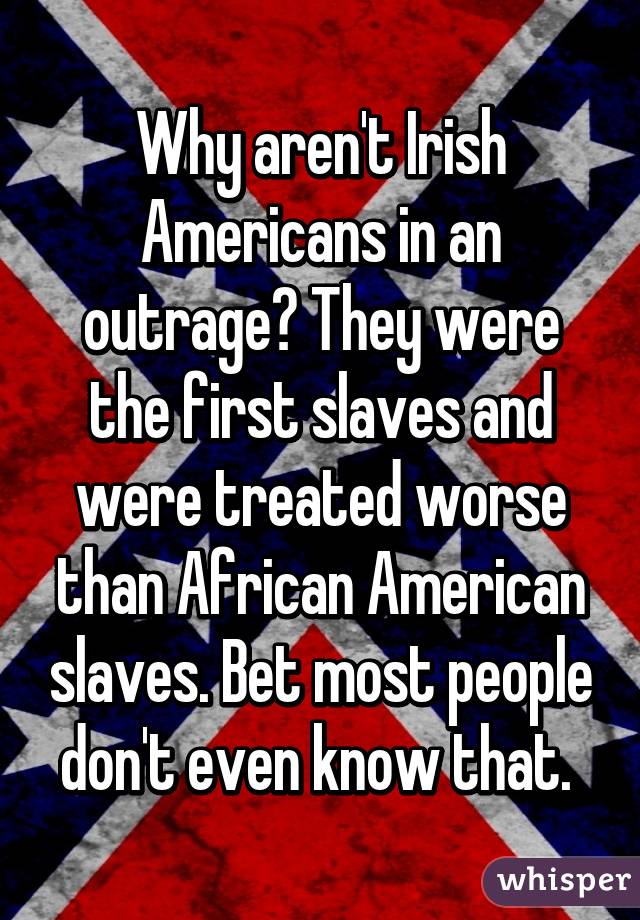
Irish scholar Liam Hogan has been tracking and debunking this reincarnated meme since he commencement saw it in 2013. Last year, Hogan published an impressive five-part series exposing the myth and provided a detailed historical analysis of the origins and evolution of the meme.
Hatewatch reached out to Hogan (who you should follow on Twitter) and asked him to share what he's learned in his work.
What's your academic background peculiarly equally information technology applies to the study of systems of slavery?
I'k a research librarian at the Limerick Metropolis Library and an independent scholar. I am particularly interested in the circuitous historical human relationship betwixt Ireland and the Transatlantic Slave Trade. While researching this, I noticed that in that location existed many common misconceptions about what is termed "Irish gaelic slavery," which is applied in diverse ways to the Irish experience in the Anglo-Caribbean, Colonial America and the United States. I've since tried to contextualize this important office of Irish gaelic diasporic history for the general public while debunking some of the more egregious pieces of disinformation that are currently en vogue. I also track white nationalist groups and others who have purposefully spread "white slavery" or "Irish slavery" propaganda online since at least 1998.
And let's clear the air: Are you Irish?
Yes. I'one thousand from Youghalarra, which is a hamlet nigh Lough Derg in Co. Tipperary.
Briefly stated, what are the historical claims behind the "Irish slaves" meme?
It broadly claims that indentured servitude and penal servitude can be equated with racialized perpetual hereditary chattel slavery. It proclaims that an "Irish gaelic Slave Trade" was initiated in 1612 and non abolished until 1839, and that this concurrent transatlantic slave trade of "white slaves" has been covered up by "liberal," "cultural Marxist" or "politically right" historians.
The various memes brand many claims including (but non limited to) the post-obit; that "Irish slaves" were treated far worse than black slaves; that in that location were more "Irish slaves" than black slaves; that "Irish slaves" were worth less than black slaves, that enslaved Irish women were forced to breed with enslaved African men, and that the Irish were slaves for much longer than black slaves.
This is then invariably followed up by overtly racist statements, e.g. "yet, when is the last time yous heard an Irishman bitching and moaning almost how the world owes them a living?" The "Irish slaves" meme is a subset of the "white slavery" contemporary discourse which emphasizes class over race and is fueled by a potent cocktail of bad history, fake equivalence, conspiracy theories, and reductionist fallacies.
Your writing points to one of the primeval reported instances of the online meme actualization in Dec 2013, when a New Mexican Tea Party leader tweeted a version. When did you first encounter the meme online, and accept you been able to isolate its earliest appearance on the social web?
I first noticed the internet meme of "Irish slavery" in 2013 on Facebook when that Global Research article went viral. Irish politicians, celebrities, and the wider public began sharing it en masse from then on. Later on reading it, I immediately saw the trouble, merely I was unsure how to tackle it. And then I continued my own inquiry and the following summer I published an article on theJournal.ie (a popular Irish news site) about absentee slave-owners in Ireland who claimed compensation for their human stock in the British West Indies in 1834. I was surprised to find that the most popular below the line comment by far was an excerpt of theGlobal Inquiry "Irish slaves" text.
It was quite clear to me then that many would never engage with the history of the transatlantic slave trade when they had this false equivalence to fall back on. I think that's what convinced me that I needed to put the record direct. Dr. Stephen Mullen has too challenged a like phenomenon in Scotland where a "Scottish slaves" narrative is evoked to avoid against their considerable history of interest in race-based plantation slavery in the 'New World'.
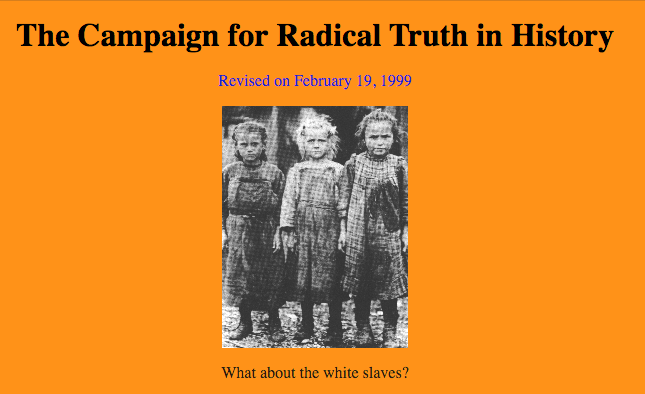
Michael Hoffman's website in 1999 via the Cyberspace Archive.
I've yet to isolate its earliest appearance on the social spider web, but it has been a mutual trope on Stormfront since at least 2003, especially in opposition to reparations for slavery. The earliest "white slavery" meme that I could observe on the spider web appeared on Michael A. Hoffman'due south website in 1999 when he captioned a photo of child laborers in the early 20th century with the line "what near the white slaves?" This same photograph is the centerpiece of a new iteration of the "Irish slaves" meme that appeared on Facebook in February 2016.
Y'all've described the well-nigh offensive facet of this meme being the appropriation of the Zong Massacre. Tin can you briefly summarize that for our readers?
This specific aspect of the meme is disturbing. It appropriates the massacre of around 132 African victims of the genocidal transatlantic slave trade in society to diminish it. If you lot look at the Infowars version of the meme you'll see it has even appended an actress zero, making the number of victims amount to 1302, while adding that "these slaves weren't from Africa, these forgotten souls were from Ireland." This shameless appropriation is then used past Infowars to mock calls for reparatory justice for slavery.
I think that information technology is quite telling that so many people who propagate this disinformation did not recognize such a famous criminal offence in the history of the transatlantic slave trade. Information technology suggests that there exists a critical mass of ignorance that needs to be addressed. In likewise many cases this history is perceived equally existing at a distance, in a peripheral if not marginalized space relative to the core nationalist narratives.
How has the full general meme spread? It seems to accept something of a parasitic human relationship to the rise of the Black Lives Matter movement.
I starting time noticed it on Irish social media as role curiosity propagation and part free laissez passer to dodge any discussion of Irish involvement in the slave trade. I then asked myself, if it found such utility here then what must be happening on social media in the U.Due south.? So I began to research this, and it soon became credible that the "Irish were slaves too" retort had become one of the most popular obfuscation tactics on the social spider web. And it was spreading like wildfire.
There was almost no situation where the meme was non used to derail discussions about the legacy of slavery or ongoing anti-black racism. Starting with Ferguson and with nigh every subsequent police force killing of an unarmed black person from late 2022 through 2015, the meme was used to mock and denigrate the Black Lives Matter movement. It is in a sense the "historical" version of the disingenuous All Lives Affair response to demands for justice and truth telling. I take seen it used to derail conversations about Sandra Bland, the McKinney puddle party incident, the Spring Valley High incident then on. I accept nerveless hundreds of examples of it on Twitter (here) merely it is a more common on Facebook where it continues to incubate. Some of these racist memes on Facebook have garnered over 200,000 shares so far and i in particular was shared nearly 100,000 times in simply over a calendar week.
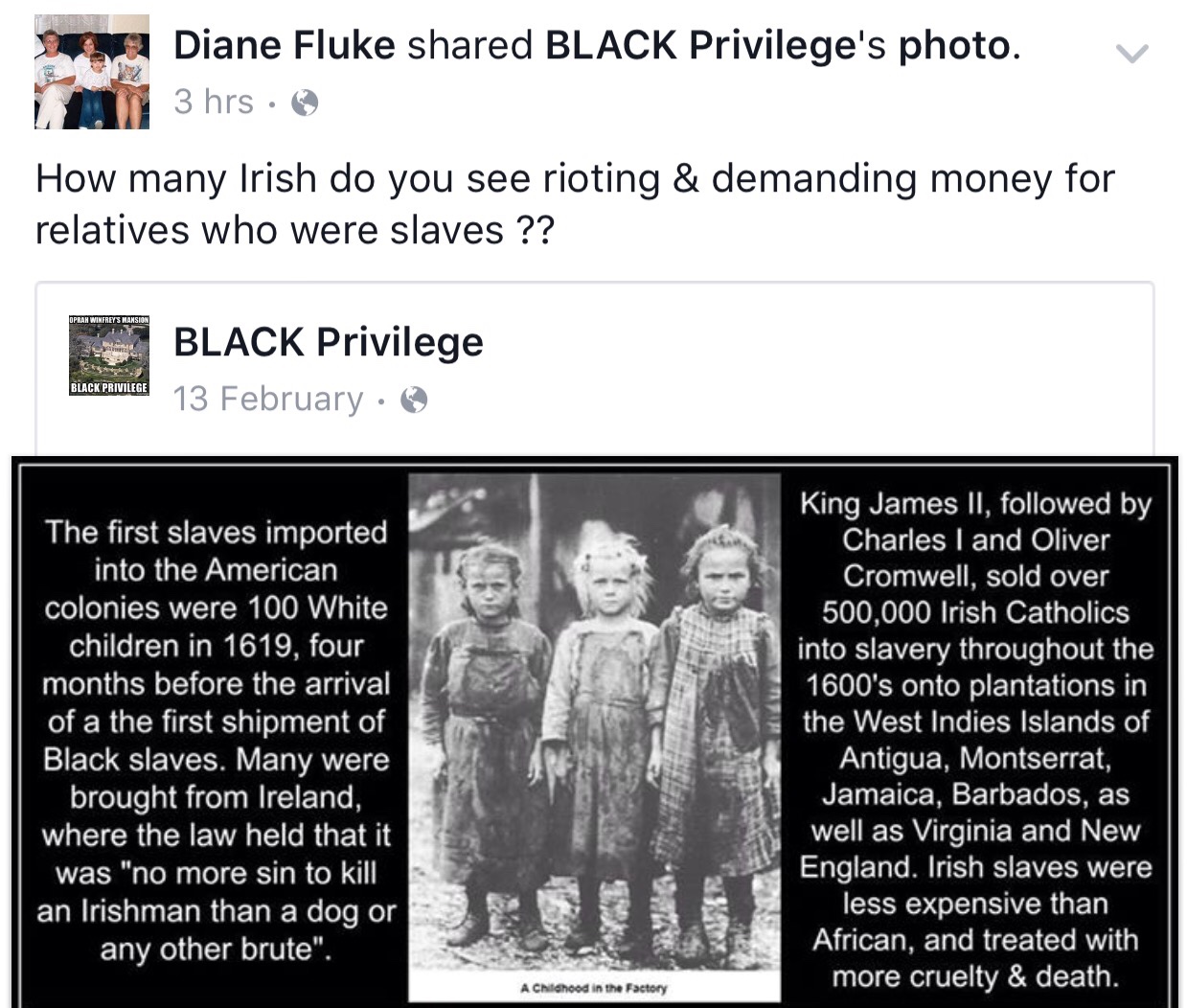
Notably the Neo-Confederate community are some other cohort who embrace the meme. In the wake of Dylann Roof's white supremacist terrorism in Charleston, and the debate about the Confederate flag, it surfaced in some unexpected places. In June 2022 a Amalgamated flag storeowner in Virginia referred to "hundreds of thousands of white slaves from Republic of ireland".
At a Confederate Flag rally in Statesville, North.C., in July 2015, a protestor told a reporter for a local newspaper, "There were more than white Irish slaves so there were blacks. And the Irish slaves were treated a lot worse than the black slaves." At a Confederate Flag rally in Mississippi in August 2022 fifty-fifty the "forced breeding" aspect of the myth appeared when a homo approached a Washington Mail journalist and said "The Irish were bred with the African slaves, you know? Even the Irish, nosotros were slaves. At some signal, you only accept to go over it."
This year I've tracked the meme being shared past the Texas League of the Due south, History of the True South, Honey My Confederate Ancestors and the Sons of Confederate Veterans. They seem to believe that this meme somehow negates the fact that the Confederacy fought a war to perpetually enslave millions of African-Americans and their descendants.
Is the meme most popular in Ireland/United kingdom of great britain and northern ireland, or just the United States?
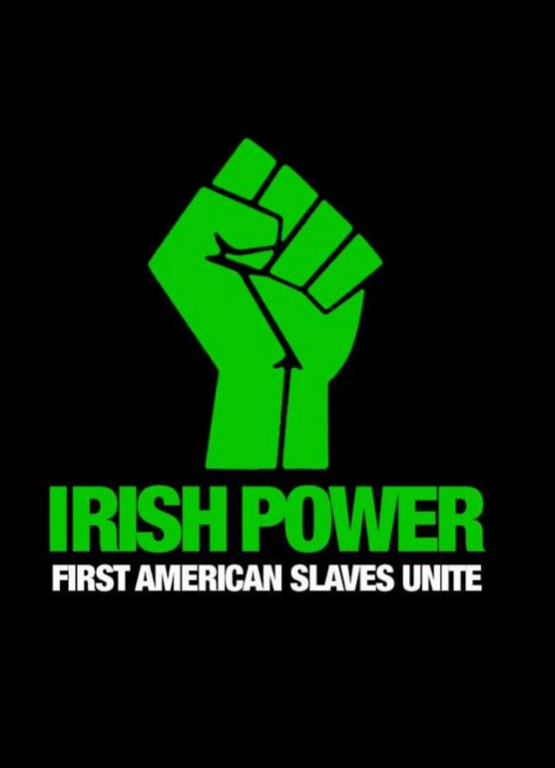
About all of the popular "Irish slaves" articles are promoted by websites or Facebook groups based in the U.South. So it's predominantly a social media phenomenon of white America.
This is even more pronounced when tracking the memes. I took a less than 0.1% random sample of that extremely popular single instance of the meme that was shared on Facebook in Feb 2016. I geotagged the location data of this sample and the effect illustrates that while this is definitely a U.S. trend, it is also present internationally in line with white nationalist sentiment. This concurs with my inquiry as I've tracked its promotion both by individuals and white nationalist groups in South Africa, Commonwealth of australia, Ireland, Great britain, Canada and Zimbabwe.
Talk about this revisionist history exterior of the online meme. You refer to books like "To Hell or Barbados" (2000) and "White Cargo" (2007) as "pseudo-history." Is it fair to call this a "revisionist projection"? If so, what are its origins?
It's complex equally there are multiple layers to this. The near crude are the various racist visual cyberspace memes in circulation. Side by side y'all have a wide range of ahistorical "Irish slaves" blogs and articles that are promoted by loftier traffic sites like Daily Kos. I believe the fact that major media outlets have endorsed this narrative is an important factor in explaining why this mythology has gone mainstream. People trust these sources and assume that editors take verified the claims made and are accurate. Rather than existence informative they are merely elongated memes congenital exclusively on disinformation and baloney. Thousands of well meaning people have been duped in this manner.
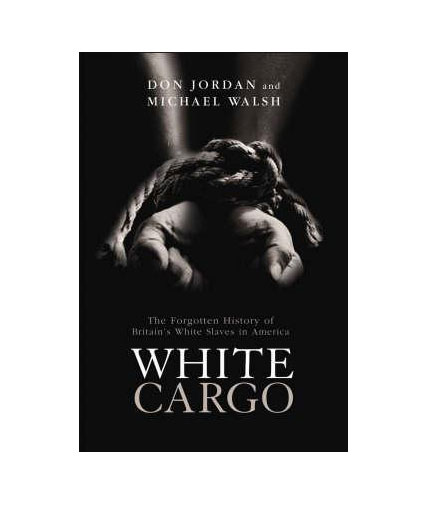
While misrepresenting the author's work, the cover epitome of "White Cargo" is used as a source for "Irish gaelic slaves" and "white slaves" propaganda.
It's declared that supporting these articles are a range of oft-referenced works of pop history authored exclusively by not-historians e.m. O'Callaghan'southward "To Hell or Barbados" (Brandon Books, 2001) or Jordan and Walsh's "White Cargo" (NYU Press, 2007). While there are issues with both of these books, particularly the former, which seeded the "forced breeding" role of the mythology, near of the "Irish gaelic slaves" articles exercise not quote from them.
By using the cover prototype of "White Cargo" they misrepresent the author'southward work every bit being the source for their propaganda when generally it is not. All the same the sensationalist cover and subtitle of this book has itself get an internet meme used to equate racialized perpetual hereditary chattel slavery and indentured servitude. These articles instead rely heavily on an unreferenced blog about "Irish slaves in the Caribbean" that appeared on the Kavanagh Family website in 2003.
More pertinent is the piece of work of Michael A. Hoffman 2, a Holocaust denier and conspiracy theorist who cocky-published "They Were White and They Were Slaves" in the early 1990s. It is past far the most influential book on so-called "white slavery" in white supremacist circles and it appears to be the origin of this revisionist project. For instance, when researching this, I found a PDF copy of this book hosted on the Racial Volunteer Forcefulness (a Combat 18 splinter group) website. When I returned to this site some months afterward it had been shut down. Then I searched again and plant another PDF of the book on Tom Metzger's White Aryan Resistance (WAR) website.
It is not difficult to sympathize why white nationalists and fascists dear this volume. It argues that all European indentured servants, child laborers, convicts, gratis laborers, impressed sailors, the poor and the general working class population were unequivocally "white slaves." That "white guilt" is an invention of the elite and that poor white Americans also deserve reparations considering their ancestors besides endured "slavery." Affiliate titles include "White Slaves Treated Worse than Blacks" and "White Losses in the Heart Passage Higher than that of Blacks." The book includes testimonials from Revile P. Oliver, Wilmot Robertson and James J. Martin and an excerpt ("The Truth about Slavery") has featured on the website of the Occidental Pan-Aryan Crusader since 1998. This group was a member of William Pierce'due south National Alliance.

Self-published in the early on 90s, "They Were White and They Were Slaves" was written by Holocaust denier and conspiracy theorist Michael A. Hoffman 2. The book is ane of the earlier examples of "Irish gaelic slaves" propaganda.
Hoffman, true to form, blames the "embrace up" of "the true history of white slavery" on the "approved house scholars." Unfortunately for his conspiracy theory Hoffman makes this merits in a book that is built on selective quotations taken from nigh 200 different secondary sources. Quite the cover up. This book'south sole purpose is to obscure the profound differences between white servitude and black slavery in terms of calibration, duration, type and legacy in an endeavor to deny reparations for slavery in America. Information technology is instructive to note that this is not a new development. The exact same tactics were used by contemporaries to justify the transatlantic slave trade and to defend the establishment of racialized perpetual hereditary chattel slavery in the Antebellum S and the Anglo-Caribbean.
And then this whataboutery as denialism has a pro-slavery ideological lineage and to meet information technology alluvion the social spider web in 2022 is simply remarkable.
What has been the reception to your work? From other historians? From "Irish slaves" adherents?
The response from the public has been mostly positive. For many people it seemed like this intervention was long overdue, and I estimate this as well explains why public historians take probably been the nearly enthusiastic group to support my work. In general other historians have been uncommonly helpful and supportive. I recently published an open letter addressed to some mainstream media outlets who endorsed that ahistorical Global Research "Irish gaelic slaves" commodity and 81 academics and historians co-signed. Even the near critical peer review has been well meaning, helping me to strop my arguments. Predictably I take as well received much abuse and some personal threats from various sources. I won't list all the terms of endearment that accept been thrown my way, but they range from "Jewish supremacist" and "agent of the New World Order" to a "sheltered Gratis Stater" and "anti-Irish gaelic bigot."
You mentioned you are likely to aggrandize your research into a book. What else practise you hope to explore on this topic?
I would like to reclaim the history of Irish servitude in the 17th century Anglo-Caribbean and present it in context for a full general audience. The Cromwellian policy of forced transportation to the colonies in the 1650s (which included an estimated 10,000 Irish people) understandably scars our commonage memory and information technology deserves both respect and close attention from anyone interested in the history of the unfree labour systems in the Atlantic world. Prior to the carbohydrate revolution and the massive investment by Europeans in enslaving and dehumanizing African people, the living and working conditions of servants and slaves were like. As the British colonies transitioned to large-scale saccharide plantations both groups were exploited for profit, indentured servants for decades and enslaved Africans for centuries.
I as well hope to explore why the meme appeals to racists. Why is it used so often to justify anti-black nativism and racism? The sentiment is we were slaves, besides, but we moved on, and information technology speaks to the racist essence of white nationalism. This notion of racial assimilability tin be traced back to Wilmot Robertson'due south The Dispossessed Majority and if you get back further you lot'll see that its principal origin is the fascist ideologies of the 1930s, especially Benito Mussolini'south Italian Fascist Party. Their "Manifesto of Race" was published in 1938 and is a white nationalist playbook.
The racism then flows as these diverse groups of Neo-Nazis posit why whites can overcome a "worse" situation than blacks and "practise not whine about information technology." And then the "get over it" racism that so frequently accompanies the meme is not near history at all. Information technology goes much deeper than that. Their belief is that non-whites can't motility on due to racial inferiority or social pathology. So through false equivalence and erasure, they attempt to remove history equally a determinant so that they can merits the current socioeconomic position and mass incarceration of black people in the U.Due south. is due to racial inferiority. I believe William H. Tucker'south piece of work on the Pioneer Fund resonates hither. He charges that while the Pioneer Fund may have "supported some projects of genuine scientific interest," they were incidental to its true purpose, which was "to provide intellectual justification for racial prejudice."
Besides these "Irish slaves" and "white slaves" memes projection a pseudo-mythological narrative to provide (a)historical justification for racial prejudice. This explains why the memefication of "white slavery" is catnip for racists.
cardenasmorove1951.blogspot.com
Source: https://www.splcenter.org/hatewatch/2016/04/19/how-myth-irish-slaves-became-favorite-meme-racists-online
0 Response to "Here We Go Again With the Slavery Meme"
Post a Comment